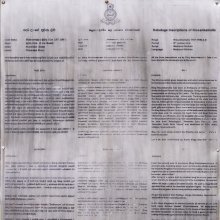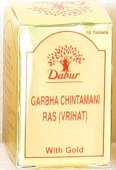Vanga, Vāṅga, Vaṅga, Vaṅgā, Vamga: 38 definitions
Introduction:
Vanga means something in Buddhism, Pali, Hinduism, Sanskrit, Jainism, Prakrit, the history of ancient India, Marathi, biology. If you want to know the exact meaning, history, etymology or English translation of this term then check out the descriptions on this page. Add your comment or reference to a book if you want to contribute to this summary article.
Vanga has 37 English definitions available.
Images (photo gallery)
Languages of India and abroad
Sanskrit dictionary
[Deutsch Wörterbuch]
Source: Cologne Digital Sanskrit Dictionaries: Böhtlingk and Roth Grosses Petersburger WörterbuchVaṅga (वङ्ग):—
1) m. Nomen proprium eines Volkes (pl.) und des von ihm bewohnten Gebietes (sg.), das eigentliche Bengalen [Hemacandra’s Abhidhānacintāmaṇi 957.] [Anekārthasaṃgraha 2, 48.] [Medinīkoṣa g. 22] (lies vaṅgaṃ st. raṅgaṃ). [Lassen’s Indische Alterthumskunde I, 143, Nalopākhyāna 1.] gaṇa gahādi zu [Pāṇini’s acht Bücher 4,2,138.] [Pāṇini’s acht Bücher 1,2,51, Scholiast] [Vopadeva’s Grammatik 7,14.] [Pariśiṣṭa des Atharvaveda] in [Weber’s Indische Studien 10,319.] [WEBER, Nakṣ. 2,392.] [Mahābhārata 1,4220] (sg.). [5,1986.6,353] ([Viṣṇupurāṇa 188]). [Harivaṃśa 1692. 4967. 6607. 6631. 6650. 9147. 11201. 12831.] [Rāmāyaṇa 4,40,25.] [Raghuvaṃśa 4,36.] [Varāhamihira’s Bṛhajjātaka S. 5,72. fg. 79.9,10. 10,14. 14,8. 16,1. 17,18. 32,15.] [Mārkāṇḍeyapurāṇa 58,16.] [Prabodhacandrodaja 87,19.] [Oxforder Handschriften 102,a, No. 158. 217,b,19. 258,b,28. 352,b,9.] [KṢITĪŚ. 1,6. 12,8. 25,1. 41,2. 46,7. 56,15.] lipi [Rgva tch’er rol pa ed. Calc. 143, 17.] Der Name des Volkes wird auf einen gleichnamigen Sohn der Sudeṣṇā und des Dīrghatamas (Dīrghatapas) zurückgeführt [Mahābhārata 1, 4219. fg.] [Harivaṃśa 1684. fg.] [Viṣṇupurāṇa 444.] [Bhāgavatapurāṇa 9, 23, 4.] —
2) Baumwolle, m. [Hemacandra’s Anekārthasaṃgraha,] n. [Medinīkoṣa] —
3) Solanum Melongena, m. [Hemacandra’s Anekārthasaṃgraha,] n. [Trikāṇḍaśeṣa 2, 4, 28.] [Medinīkoṣa] —
4) n. Zinn (raṅga, trapu) [Amarakoṣa 2, 9, 106.] [Hemacandra’s Abhidhānacintāmaṇi 1042.] [Hemacandra’s Anekārthasaṃgraha] [Medinīkoṣa] [Halāyudha 2, 17.] Blei [Hemacandra’s Anekārthasaṃgraha] [Medinīkoṣa -] [Weber’s Verzeichniss No. 969. 971.] [Oxforder Handschriften 320,b, No. 760.] — Vgl. adhi, ku, cīna, vāṅga, vāṅgaka .
--- OR ---
Vāṅga (वाङ्ग):—m. ein Fürst der Vaṅga [Pāṇini’s acht Bücher 4, 1, 170, Scholiast] [Varāhamihira’s Bṛhajjātaka S. 11, 60.] [?als Dichter Verz. d. Tüb. H. 13.]
Sanskrit, also spelled संस्कृतम् (saṃskṛtam), is an ancient language of India commonly seen as the grandmother of the Indo-European language family (even English!). Closely allied with Prakrit and Pali, Sanskrit is more exhaustive in both grammar and terms and has the most extensive collection of literature in the world, greatly surpassing its sister-languages Greek and Latin.
See also (Relevant definitions)
Starts with (+60): Vamgada, Vamgadadege, Vamgadisu, Vanga Vanga, Vangabhasma, Vangadasa, Vangadattavaidyaka, Vangadhara, Vangadvel, Vangaj, Vangaja, Vangajivana, Vangaka, Vangala, Vangalasangala, Vangalavana, Vangali, Vangalika, Vangalipi, Vangana.
Ends with (+76): Abhishvanga, Adavilavamga, Adhivanga, Alavamga, Amgovamga, Amguvamga, Anabhishvanga, Avanga, Avavamga, Avvamga, Ban-lavanga, Bhavanga, Bhuvanga, Bhvanga, Carusarvanga, Cavamga, Chinavanga, Cinavanga, Cuddoolavanga, Cuddu lavanga.
Full-text (+156): Vangari, Kuvanga, Vangaka, Cinavanga, Vangashulvaja, Vangasena, Vangala, Vangiya, Pravanga, Vangaja, Vangajivana, Vamga, Harikeliya, Samatata, Nidupu vanga, Niru vanga, Siru vanga, Vangadattavaidyaka, Voa vanga, Verri vanga.
Relevant text
Search found 46 books and stories containing Vanga, Vamga, Vaṃga, Vāṅga, Vaṅga, Vaṅgā; (plurals include: Vangas, Vamgas, Vaṃgas, Vāṅgas, Vaṅgas, Vaṅgās). You can also click to the full overview containing English textual excerpts. Below are direct links for the most relevant articles:
Mahavamsa (by Wilhelm Geiger)
List of Mahabharata tribes (by Laxman Burdak)
Jain Remains of Ancient Bengal (by Shubha Majumder)
Geographical as well as Geo-political unit of Zone II < [Chapter 2 - Geographical Setting of the Study Area]
The twenty-four Tīrthaṅkaras and their Yakṣas and Yakṣiṇīs < [Chapter 6 - Iconographic Study of Jaina Sculptural Remains]
Images of Tīrthaṅkara Mallinātha < [Chapter 6 - Iconographic Study of Jaina Sculptural Remains]
Rasa Jala Nidhi, vol 3: Metals, Gems and other substances (by Bhudeb Mookerjee)
Part 3 - Incineration of tin < [Chapter VI - Metals (6): Vanga (tin)]
Part 1 - Characteristics of Tin (vanga) < [Chapter VI - Metals (6): Vanga (tin)]
Part 5 - Taking of tin < [Chapter VI - Metals (6): Vanga (tin)]
Mahabharata (English) (by Kisari Mohan Ganguli)
Puranic encyclopaedia (by Vettam Mani)
Related products
(+32 more products available)






